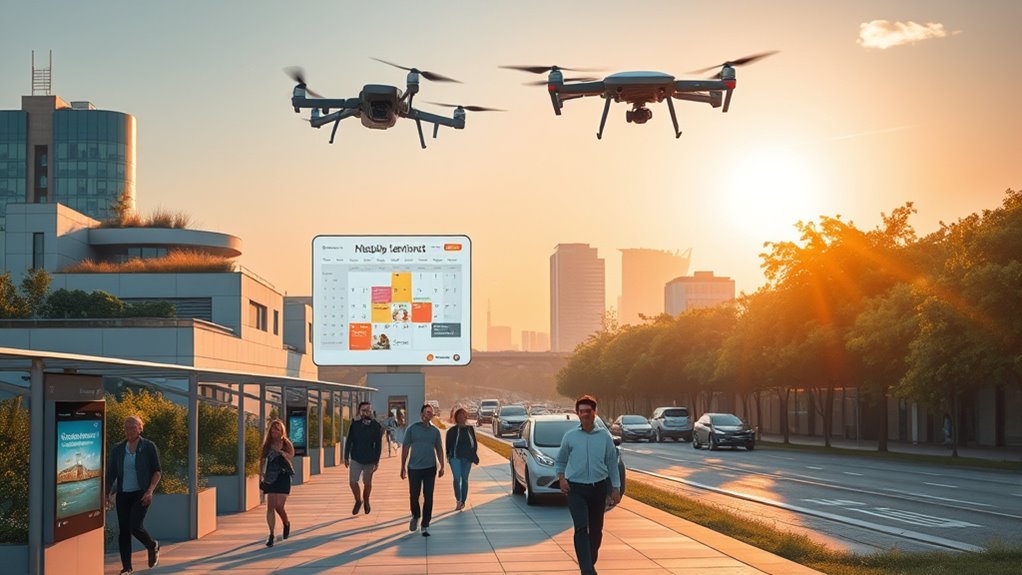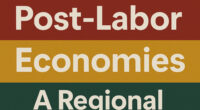After the 40-hour workweek, automation frees up your time for creativity, leisure, and personal growth. Your daily routines become less stressful, with fewer repetitive tasks and more focus on meaningful work. You enjoy flexible schedules, increased job satisfaction, and opportunities to learn new skills. Society transforms around you, with new roles emerging and smarter lifestyles developing. Curious how these changes shape your future? Keep exploring to discover the full picture.
Key Takeaways
- Automation reduces traditional work hours, increasing leisure time and enabling more focus on personal hobbies and community engagement.
- Daily routines become less stressful, with smart technologies and ergonomic setups enhancing focus and well-being during autonomous work periods.
- New roles like AI ethics leads and prompt engineers emerge, emphasizing strategic oversight and collaboration with intelligent systems.
- Shorter work hours promote better work-life balance, decreasing fatigue and stress while boosting overall job satisfaction.
- Increased virtual, autonomous travel, and smart home integration transform daily life, offering more immersive experiences and streamlined routines.
The Shift in Standard Work Hours and Routines

As automation becomes more widespread, the traditional 40-hour workweek is gradually shifting. You’ll likely find yourself with more leisure time, thanks to machines handling routine tasks. This extra free time can improve your work-life balance and give you space for personal activities or hobbies. Automation also frees up hours, allowing you to focus on learning new skills or exploring different career paths. Your daily routines may change considerably, with less stress from repetitive work. You might spend more time engaging socially or participating in community events. Additionally, organization and space management become increasingly important as you adapt to a less cluttered and more efficient lifestyle. Moreover, understanding the impact of privacy and data security is crucial as you navigate these changes. These shifts may also lead to economic changes, influencing consumer spending and industry growth. Overall, your work schedule will evolve, offering more flexibility and opportunities to redefine how you spend your days.
Redefining Productivity and Employee Satisfaction

As work hours decrease, your focus shifts from simply getting more done to working smarter and more creatively. Automation and increased autonomy let you prioritize meaningful tasks and enjoy a better work-life balance. This change not only boosts satisfaction but also redefines what productivity truly means. Incorporating versatile tools like a conversion kit can enhance your commuting experience, reflecting the broader trend of integrating innovative solutions into daily routines.
Enhanced Work Autonomy
Enhanced work autonomy is transforming how we measure productivity and employee satisfaction. With more control over when and how you work, you’re often more productive; 77% of remote workers report increased output, with many accomplishing more in less time. Freelancers, averaging over seven productive hours daily, thrive on pay-for-performance incentives, while office workers typically clock just over two hours of focused work in an eight-hour day. Autonomy allows you to work during your peak hours and tailor your environment, boosting morale and engagement. Most employees prefer working remotely, feeling more satisfied and less stressed. This shift enables companies to focus on results rather than hours, trusting you to manage your time effectively. Remote work has been shown to increase productivity by 62%, so autonomy fosters higher productivity, better work-life balance, and greater overall satisfaction. Additionally, sound design techniques such as customizing your workspace with appropriate ambient sounds can further enhance focus and well-being during autonomous work periods. Incorporating self-management skills can also optimize your ability to stay disciplined and effective in a flexible work environment. Furthermore, remote collaboration tools facilitate seamless communication and team coordination, making autonomous work more efficient and cohesive. Developing an understanding of Glycolic Acid benefits and how it can improve skin health can also be a valuable aspect of self-care routines, especially when working remotely and managing personal wellness. Understanding the importance of ergonomic workspace setup can also significantly improve comfort and reduce fatigue, enhancing overall productivity during remote work.
Focus on Creativity
The newfound autonomy in your work life opens up opportunities to prioritize creativity alongside productivity. With automation handling routine tasks, you can focus on higher-value activities like problem-solving and innovation. This shift boosts job satisfaction; 64% of European workers say they’d enjoy work more if they had more creative tasks. Automation frees up time, enabling you to channel efforts into strategic thinking and client engagement. Consider how these aspects intertwine:
| Aspect | Impact | Result |
|---|---|---|
| Routine Tasks | Reduced through AI automation | More time for creative work |
| Creative Engagement | Increased with autonomy | Higher job satisfaction |
| Organizational Growth | Driven by innovation and problem-solving | Competitive advantage |
Additionally, understanding the safety features of devices like electric heated mattress pads can ensure safe enjoyment of comfort-enhancing products. Moreover, fostering a creative mindset can help you adapt to the evolving workplace landscape and seize new opportunities. Developing skills in predictive modeling can further enhance your ability to innovate and make data-driven decisions. Recognizing the importance of ethical hacking principles can also contribute to maintaining secure and trustworthy systems as automation becomes more prevalent. Ultimately, focusing on creativity redefines productivity, enriching your work experience and fueling continuous growth. Additionally, exploring best anime movies can inspire creative thinking and broaden your perspective outside work.
Reduced Work Hours
Reducing work hours doesn’t necessarily mean sacrificing productivity; in fact, it can maintain or even boost your output. Shorter hours often lead you to work smarter, not harder, streamlining processes and minimizing distractions. Overworking, on the other hand, decreases efficiency and hampers performance. When you work fewer hours, stress and fatigue lessen, improving your overall work quality and well-being. Plus, a better work-life balance makes you more engaged and satisfied with your job. Study results on shortened work weeks highlight that workplace productivity and service levels stayed the same or increased despite reduced hours. Consider these benefits: 1. Increased productivity through efficiency improvements 2. Enhanced well-being and reduced burnout 3. Higher job satisfaction and engagement
New Skills and Roles in an Automated Workforce
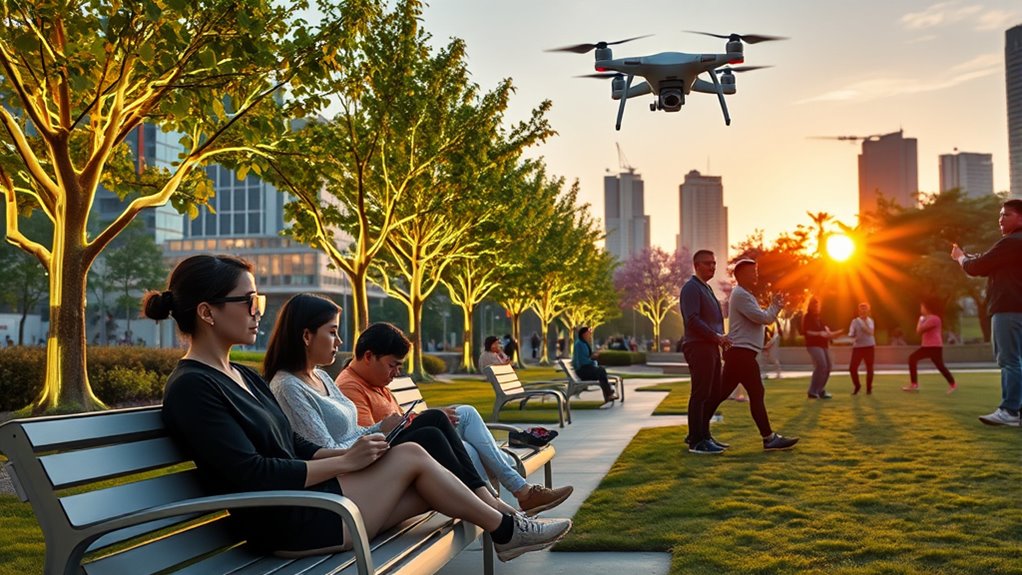
As automation reshapes workplaces, you’ll need new skills like creativity, ethical judgment, and digital collaboration to stay relevant. Emerging roles such as AI-assisted design and human-robot collaboration offer exciting opportunities, but they also require continuous reskilling. By embracing ongoing learning and developing strong human-AI teamwork, you can thrive in this evolving landscape. Developing a deeper Self-Understanding can further enhance your adaptability and personal growth in this new environment. Additionally, understanding automation in business can help individuals anticipate industry changes and identify new opportunities for growth.
Emerging Job Opportunities
Ever wonder how automation is reshaping the job market? It’s opening new opportunities with roles that didn’t exist a decade ago. As AI and machine learning grow, you’ll find demand for specialists in these fields surging. Here are three emerging job opportunities:
- Prompt Engineers – designing effective prompts for generative AI.
- AI Ethics Leads – ensuring responsible AI development and use.
- Digital Identity Managers – safeguarding digital transactions and identities.
These roles reflect a shift toward managing, guiding, and ethically deploying AI technology. While traditional clerical jobs decline, new positions focus on complex, creative, and strategic tasks that machines can’t easily replicate. Additionally, understanding AI security is crucial for protecting digital assets and maintaining trust as these technologies become more integrated into daily life. Embracing these opportunities will be key to thriving in a future shaped by automation, which also emphasizes the importance of personality traits like open communication and adaptability for success in evolving workplaces.
Reskilling and Education
With automation transforming industries, reskilling has become essential for workers to stay relevant and competitive. Over 85% of employers plan to prioritize reskilling to close skill gaps and prepare for future demands. Digital skills, especially AI, big data, cybersecurity, and technological literacy, are in high demand. Human-centric skills like creativity and critical thinking remain crucial, complementing technical expertise. Despite rising needs, only 34% of organizations have actively reskilled employees for AI tools, often due to high training costs and fears of job loss. Employees’ concerns about automation drive companies to invest more in AI training, which improves retention and accelerates innovation. Leadership that emphasizes creative practice and continuous learning can better adapt to technological changes. Leaders who embed reskilling into their strategy and foster lifelong learning position their organizations for resilience and growth in an automated future.
Human-AI Collaboration
Human-AI collaboration is transforming workplaces by enabling professionals to amplify their capabilities and achieve higher productivity. With AI tools like ChatGPT, you can boost your writing efficiency by 37%, especially if you’re less experienced. This partnership enhances output quality by blending AI’s data-processing power with your contextual judgment. It also frees you to focus on strategic, creative tasks, fostering faster problem-solving and innovation. Additionally, this synergy encourages the development of new skills essential for thriving in an automated environment. Here are three key ways this collaboration shapes your future role:
- You’ll oversee, coordinate, and provide high-level feedback to AI systems.
- New roles like AI translators and supervisors will bridge human goals with AI capabilities.
- Hybrid teams combining human expertise and multiple AI agents will tackle complex challenges effectively. Furthermore, understanding cultural intelligence concepts can contribute to better team dynamics and emotional intelligence in collaborative settings. Recognizing the importance of natural materials can also enhance the authenticity of your collaborative efforts. Embracing smart home technologies can improve workplace environments by creating more comfortable and efficient spaces. This synergy empowers you to work smarter, not harder, in an increasingly automated world.
How Daily Life and Leisure Will Evolve

As automation takes over routine tasks, your daily life and leisure activities will transform profoundly. You’ll find more time for immersive virtual reality adventures, exploring new worlds without leaving home. Travel could become more accessible, thanks to autonomous vehicles, giving you longer explorations. Personal development will shift from passive entertainment to skill-building and hobbies. Community programs and green spaces will grow, encouraging social and outdoor activities. Household robots will handle chores, freeing you from mundane tasks. Wearable tech and smart clothing will streamline routines, making daily life more efficient. Studies on hydrocolloid technology show how advanced materials can accelerate healing and improve skincare outcomes. Additionally, smart home devices will optimize energy use and enhance convenience in everyday routines. As these technologies evolve, they will further integrate seamlessly into everyday life, creating a more connected and efficient environment.
Societal Changes and Economic Impacts of Automation
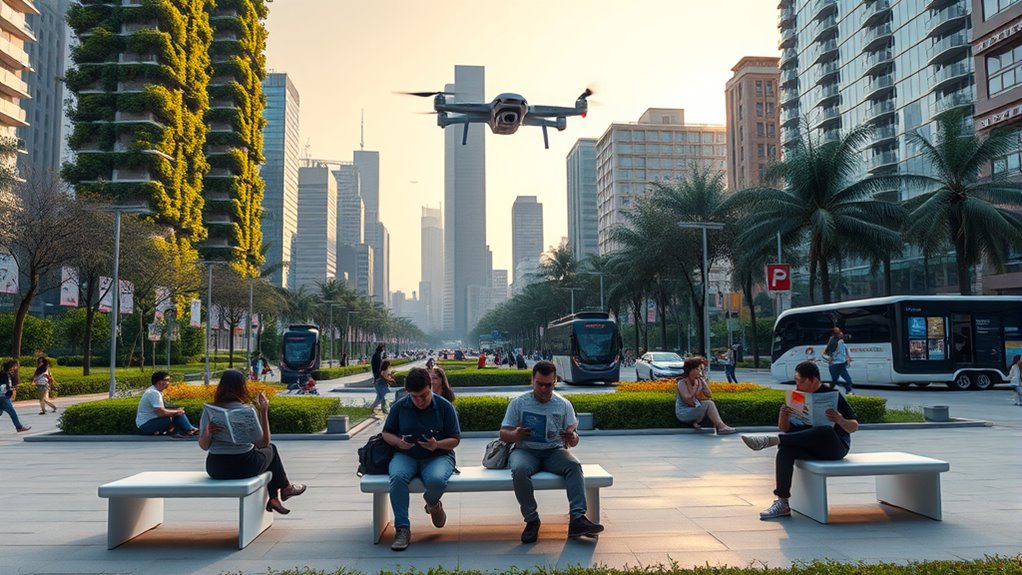
Automation is rapidly transforming society by reshaping workforce dynamics and economic structures. You’ll see jobs evolve, with AI potentially replacing 300 million roles worldwide, impacting over 9% of all jobs. At the same time, the demand for new skills, like AI literacy, grows, and many roles are augmented rather than replaced—66% of finance leaders expect minimal workforce loss. Employers plan to retrain 77% of employees to work alongside AI, and by 2030, 14% may switch careers due to automation. Economically, automation offers a $4.4 trillion productivity boost, enhances operational efficiency, and risks disrupting over half the global economy. Key points include:
- Job shifts and skill demands
- Economic growth vs. disruption
- Workforce adaptation strategies
Preparing for a Future Dominated by Intelligent Machines
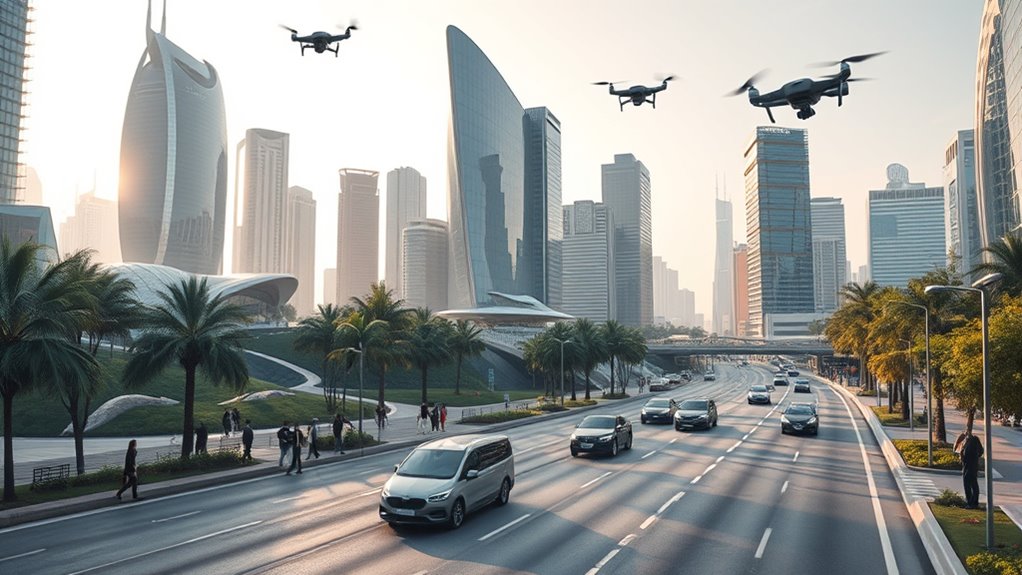
Preparing for a future dominated by intelligent machines requires proactive action from workforces and organizations alike. You should focus on developing skills that complement AI, like creativity, critical thinking, and adaptability, as automation transforms industries such as manufacturing, finance, and healthcare. Nearly half of today’s tasks can already be automated, so staying current with technological advancements is essential. Workers will need ongoing training to prevent job displacement and seize new opportunities created by automation. Organizations must prioritize ethical AI use and guarantee human oversight, especially as around 23% of jobs will change by 2027. Embracing lifelong learning and fostering a future-ready workforce will help you navigate this shift successfully, securing you remain valuable in an increasingly automated world.
Frequently Asked Questions
How Will Automation Affect Global Income Inequality Long-Term?
Automation will likely widen global income inequality long-term. You’ll see wealth concentrate among capital owners and high-skilled workers, leaving lower-skilled populations behind. As more jobs get automated worldwide, emerging markets may struggle to compete, deepening disparities. To adapt, you need to invest in education, retraining, and policies that support social safety nets. Without these efforts, the gap between rich and poor risks growing even more pronounced.
What Ethical Issues Arise From Increasing Reliance on AI in Workplaces?
When AI becomes the silent conductor of your workplace symphony, ethical issues emerge like hidden discord. You face questions about bias, privacy, and fairness. Will AI play fair, or will it echo prejudices? You must guarantee transparency, guard privacy, and promote human-centric policies. As the gatekeeper, you hold the power to shape AI’s role—making it a tool for empowerment rather than an instrument of inequality or discrimination.
Will Universal Basic Income Become Necessary Due to Job Displacement?
You might find that UBI becomes essential as automation displaces many jobs, leaving you without traditional income sources. With fewer employment opportunities, society could rely on UBI to guarantee everyone’s basic needs are met. While it’s debated, many believe that as machines take over routine tasks, a universal safety net will be necessary to maintain financial stability and prevent widespread poverty.
How Will Automation Influence Mental Health and Work-Life Balance?
Automation will notably impact your mental health and work-life balance by increasing job insecurity, stress, and emotional strain. You might feel overwhelmed by the need to constantly update skills or work longer hours to stay ahead. However, flexible work options and supportive workplace programs can help you manage these challenges. Staying informed, advocating for fair policies, and prioritizing self-care will be key to maintaining your well-being amid automation‘s rise.
What Policies Are Needed to Ensure Fair AI Implementation Across Industries?
You need policies that promote transparency, fairness, and accountability in AI use across industries. These should include industry-specific regulations, ongoing education for workers, and standards for AI safety and ethics. Public engagement is essential to shape effective rules, ensuring AI benefits everyone. By prioritizing privacy, reducing bias, and fostering collaboration, you can help create a fair AI landscape that boosts innovation while protecting rights and equity.
Conclusion
So, when automation finally takes over the 40-hour workweek, don’t forget to thank your friendly robots for your extra leisure time. Now you’ll have plenty of moments to ponder life’s big questions—like whether your AI overlords will decide your hobbies are too boring. But hey, at least you won’t have to work so hard—just enough to keep the machines happy. Enjoy your new life of leisure, courtesy of the brave new automated world!
